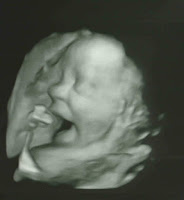A former late-term abortion nurse speaks out
Warren Hern is one of the few people in the United States who openly performs abortions even after 24 weeks gestation. He performs abortions in Colorado, one of a handful of states that have no gestational limits on abortion — that is, it is legal to perform abortion for any reason at any point in the pregnancy. (Pro-life advocates on the ground are working to change that.)
 |
| 3D image of a 28-week-old baby in the womb |
Hern has gone on record explaining that the later abortions he performs are not always for women facing any grave medical outcome. He has also published work exploring how abortion workers (both doctors and nurses) are emotionally and psychologically impacted by late-term abortion. His work has been incredibly frank, providing a sharp contrast to the strident euphemisms of many pro-choice advocates.
Julie Wilkinson worked as a nurse in Hern’s clinic for years, but she is now passionately pro-life and works in a NICU instead. I recently read a piece in New American about her conversion. Here are a few random thoughts a bit too long for a FB post:
Though an abortion was not something I ever planned to have, I rationalized the deaths of the infants: All the abused babies and children were better off going to heaven than being born and suffering if they were unwanted.
Several notes about this mentality:
- Usually religiosity correlates with being anti-abortion. Still it’s interesting (and disheartening) to see how belief in an afterlife can help people feel complacent about taking lives. This is in line with what we’ve previously written about the “Abortion Religion,” in which abortion supporters appropriate supernatural concepts like reincarnation to justify violence against children in the womb.
- The idea that children born of unintended pregnancies will be unwanted is largely a myth. Research has found that the vast majority of women who sought but were denied abortion and went on to birth their children raised their children themselves and bonded to their children just fine.
- Notice that very few (if any) people take the above mentality and apply it to born children. We don’t argue that the solution to child abuse is to euthanize the children being abused, so they can be better off in heaven.
I was raised a Christian and still considered myself one, mind you, but I attended church rarely.
This makes sense. Being pro-choice is inversely correlated with church attendance.
After a few weeks, I was taught how to assist with late cases, 13-24 weeks. … I would hand sterile instruments to the doctor so that he could withdraw amniotic fluid from the uterus and replace it with a concentrated urea (salt) solution, which I was responsible to mix. He said that the solution caused the placenta to separate from the uterus, resulting in the fetus dying. The truth was, the babies likely suffered terribly in the salt solution, their fragile skin and lungs being burned.
Good time to suggest everyone read the January 2020 Journal of Medical Ethics article “Reconsidering Fetal Pain,” which argues the fetus may feel pain as early as 13 weeks.
An early troubling situation occurred when a married, successful couple came to visit the clinic. They wanted a child, but they found out at 16 weeks that she was carrying twins and were not sure if twins would fit into their lifestyle. That visit bothered most of the workers, but it was no trouble for the doctor, who aborted the couple’s healthy babies a couple weeks later.
Another example of how later abortions are not exclusively done for medical reasons. On the contrary, based on what information we can find, it appears later abortions are usually not for medical reasons. In fact, Hern himself has published research saying only 30% of his patients seek second and third trimester abortions for reasons of fetal abnormality.
After a couple years, I believe the Holy Spirit began to nudge me.
I feel conflicted about this idea. On the one hand, I’m grateful for every person who moves from a pro-choice to a pro-life position, and I recognize that faith plays a role in those conversions for some people. On the other hand, if it’s the Holy Spirit doing this work, why the subtlety? Why a “nudge”? Why not a massive shove in the other direction, similar to Saul on the road to Damascus?
But I’m an atheist, so for me these questions are really just rhetorical. Whatever her reasons, I’m glad Julie changed her mind.
However, my heart didn’t change overnight. Time was necessary to change my years-long belief in a woman’s “right to choose.”
She’s not alone here. A lot of conversions are stories of a slow process, often over years. Please remember that factor when you’re talking about abortion with people who disagree. Be patient as you plant ideas, and don’t worry if you don’t see any major changes immediately. Just keep going.
After I left Boulder, I never told people what I had done there. I got married, and we had three beautiful daughters. I did not tell them my story either; I just made sure they were raised to be pro-life. It felt very lonely to keep that dreadful secret.
Julie’s reaction demonstrates why it’s so tricky to conduct accurate research regarding people’s feelings about their own choices — people who feel shame, regret, guilt, deep sorrow, or other negative emotions are less likely to speak up than people who are satisfied with their decisions. This problem is one of the major limitations of the recent highly touted study claiming 95% of women do not regret their abortions. Read more here.
Then a few years ago, another person told me I should reach out to Abby Johnson, who was a former abortion clinic director who held retreats for ex-abortion workers. So I did. I found a small, generally invisible group of people who are passionately pro-life. We have seen abortion from the inside, and we know the truth.
Abby Johnson’s pro-life work is unique and so needed. I’m glad she has created this space for former abortion workers.


Leave a Reply
Want to join the discussion?Feel free to contribute!